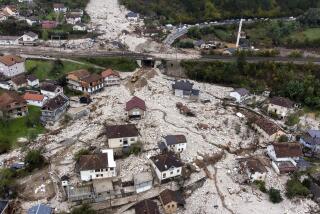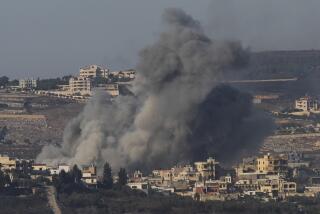Remote Hamlet Opens Arms to Ethnic Family
MALINE, Macedonia — This hamlet wedged high in the mountains is nothing more than a hundred stone huts at the end of a dirt road. Its people are sheepherders or farmers who work patches of land with horse and plow as close as 50 feet to the border with Kosovo.
Nonetheless, it is an extraordinary place.
Beginning around 2 a.m. Saturday and continuing through Sunday, more than 3,500 Kosovo Albanian refugees inundated the 400 or so Albanian Macedonians who live here. Most of the two-story, rough stone houses are packed with 25 to 30 people. Some have more than 100.
The first United Nations trucks made the trek to this remote spot Sunday to deliver blankets, food and water for the sudden influx. That is only a temporary solution. But it is enough, for now, for Maline.
“We will accept as many people as come here. We do it because we are family,” said Nijazi Sinani, 45, a village leader who has about 30 people staying in his home.
The mass illegal border crossing promises to further complicate the ongoing humanitarian crisis in Macedonia. U.N. officials want the refugees to remain in Maline as long as the United Nations can deliver adequate supplies. Macedonian officials, whom the refugees accused of abuse, are debating whether to move them to crowded refugee camps already near capacity.
Officials with the Office of the U.N. High Commissioner for Refugees said they hope to resolve the issue soon, and believe that many refugees will be able to stay with their relatives in Maline or move on to other family members in nearby communities.
“They’re doing OK for now,” said Paula Ghedini, a spokeswoman for the refugee agency. “We’ll have to see what happens” in talks with the Macedonian government.
Maline’s transformation from village to haven began last week, according to accounts from refugees. Serbian paramilitary and military units began burning homes in villages around the town of Pozaranje in southern Kosovo, a province of Serbia, the dominant republic of the rump Yugoslavia.
Whole Villages Moved at Once, Refugees Say
One man said Serbian paramilitary units had killed four people in the village of Ljubiste, including a 12-year-old boy. Nearly the whole village--about 250 people, including children and the elderly--began to move en masse Friday night, according to several refugees. People from other villages told similar tales.
By Saturday, long lines of refugees had begun hiking into the mountains that serve as the border between Yugoslavia and Macedonia, snow-capped peaks that rise to nearly 5,000 feet.
The hike took between 20 and 25 hours in rain and cold weather, according to various accounts. The elderly were carried on stretchers or horseback. Children had to walk or were carried by their parents. Three refugees said one or two children died during the march, though that could not be independently confirmed.
“I cannot explain it with words,” said Mensur Bejta, 24, who arrived Saturday and still looked exhausted from the ordeal.
Refugees finally began reaching the crest of the Black Mountains on Saturday. But once they got to the border--which runs along the ridgeline of the range--Macedonian border guards told them to stop and go back to Kosovo, they said.
The exhausted villagers said that they refused and that the guards then surrounded them and began hitting men and women. One man was knocked unconscious with a rifle butt, refugees said. Another man said that he tried to escape but that the guards fired several shots at him.
‘They Were Shooting at Me’
“I was running away, and they were shooting at me--boom boom boom,” said Ruzhdi Qerimi, 29, who arrived in Maline with about 250 other refugees at 3 a.m. Sunday.
The Macedonians turned some people back--refugees said they didn’t know the whereabouts of about 100 to 200 people--but the authorities eventually relented and let most people cross into town, where many had relatives and friends.
William Walker, head of the Organization for Security and Cooperation in Europe, tried to enter the village Sunday to check the condition of refugees, but he was refused entry by Macedonian border guards.
Walker said he protested but was told that no international observers were to be allowed in Maline. He vowed to make another attempt later this week.
Though Maline is only 15 miles north of Skopje, Macedonia’s capital, the trip takes almost three hours up a winding, one-lane mountain road. The pavement gives way to gravel, then to a rutted dirt track passable only by four-wheel-drive for the last mile. There is electricity but no running water.
Several refugees said they feared for their safety, since the village sits within sight of the border with Yugoslavia. Villagers said Serbian soldiers made raids for food across the border as recently as two months ago.
In one home Sunday, about 40 people crowded into a dark cellar. Hard-packed soil served as a floor, and soot-covered, rough-hewn wood stood for walls. A woman and about 10 children lay listlessly on a sheet thrown on a raised wooden platform in one corner. A single lightbulb illuminated the room. Six horses were stabled in the rear.
Some of the villagers had given over their entire houses to refugees. These homeowners were living in ferlas--thin, long barnlike structures made of straw that slouch beside the houses.
In the local schoolhouse--the largest building in the village, with five classrooms each the size of a large hotel room--refugees jostled for space as they strained to obtain the bread and blankets brought in by the U.N. on Sunday.
Little Medicine Left for Sick Children
Many of the children were sick, refugees said. Medical supplies were dwindling. One woman cradled her child. She cooed to him over and over as he cried.
“He has vomited five times,” Lirije Aziri, 35, said of the 5-year-old. “He won’t eat anything.”
In one schoolroom, four women sat huddled in a circle. The wooden floor was dusty and splintered. A faded map of the Balkans showing the different countries after the division of Yugoslavia hung on one wall. A gas stove provided heat.
Miradije Rashiti, 84, held her hands in her lap, her head wrapped in a scarf. She looked ahead and did not move. Her granddaughter, Hajrije Rashiti, 22, said her grandmother had fallen off a horse three times during their 21-hour journey through the mountains.
“She has aches all over her body, and she can’t eat anything,” Rashiti said. As for herself, Rashiti said she was glad to have arrived safely in Maline. “I am scared but relieved too,” she said.
Sinani, the village leader, said resources were strained, though the village was holding up well under the circumstances.
“We have food for dinner,” he said. “But for tomorrow, we have nothing.”
Many charities are accepting contributions to help refugees from Kosovo. The list may be found at http://ukobiw.net/kosovoaid.
More on the Crisis
* DISPATCH FROM KOSOVO-- Bombing has closed the door on an organization designed to bring together the province’s culturally divided youths.A9
* LAND MINE KILLS 5--A Kosovo Albanian family is 20 feet from safety when their car drives over a land mine, killing five.A10
More to Read
Sign up for Essential California
The most important California stories and recommendations in your inbox every morning.
You may occasionally receive promotional content from the Los Angeles Times.










